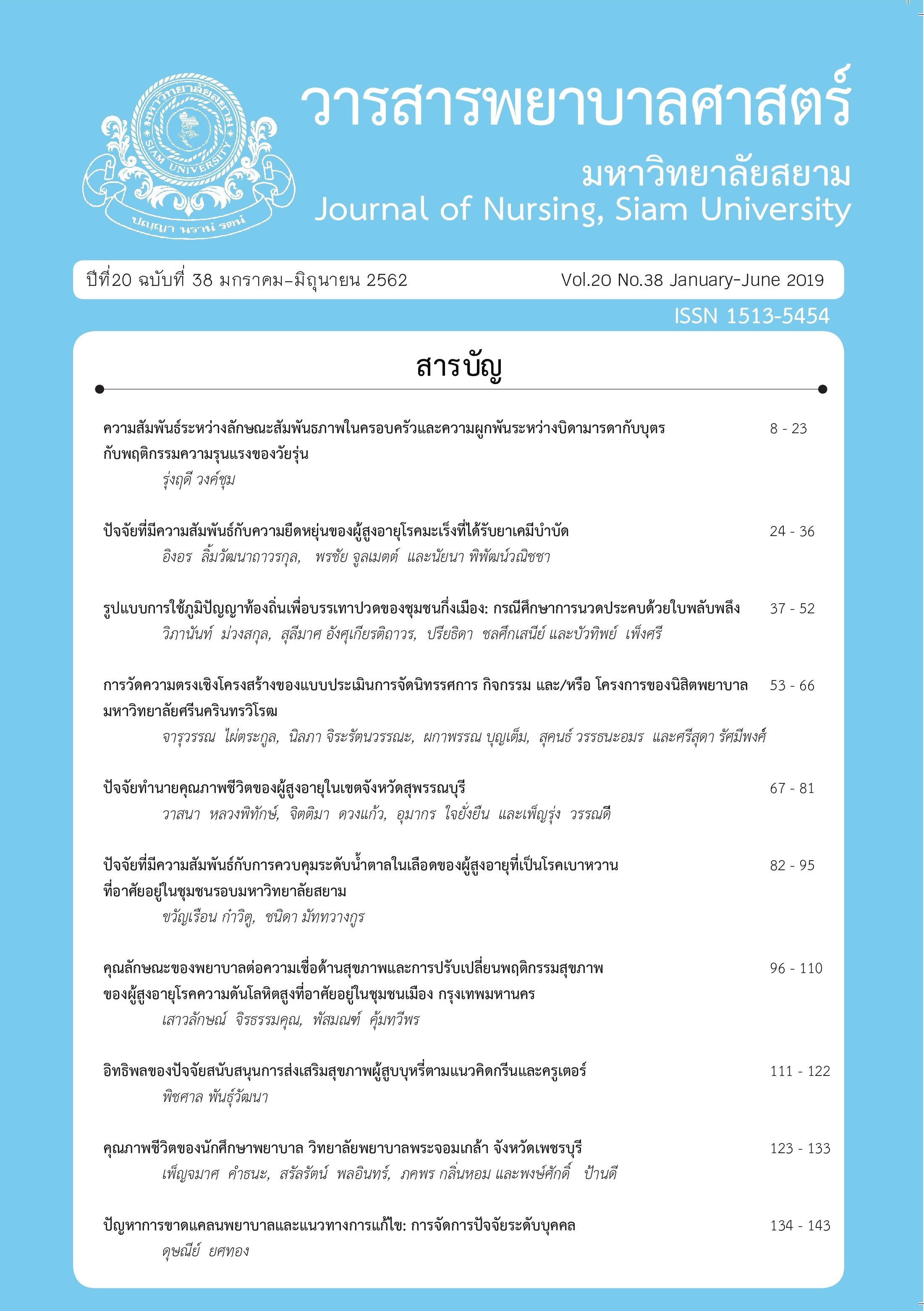Factors Related to Resilience Among Elderly Cancer Patients Receiving Chemotherapy
Keywords:
Resilience, Elderly cancer, ChemotherapyAbstract
ABSTRACT
The purposes of this research were to study the resilience of the elderly cancer patients receiving chemotherapy and its related factors including hope, coping, sense of coherence and social support. Ninety seven elderly cancer patients receiving chemotherapy at general male and female wards of Chonburi Cancer Hospital, Chonburi province. Instruments used in this study consisted of The Demographic Data Questionnaire, Hope Questionnaire, Coping Questionnaire, The Sense of Coherence Questionnaires, Social Support Questionnaire, and Resilience Scale Questionnaire. Data were collected during February to May 2017 and analyzed by use descriptive statistics and Spearman’s rank correlation coefficients were computed for data analysis.
The results indicated that the majority of elderly cancer patients receiving chemotherapy had Hope, coping, sense of coherence and social support had moderately and positively significant correlation with resilience of elderly cancer patients receiving chemotherapy. (r = .56, p < .01; r = .58, p < .01; r = .54, p < .01; r = .40, p < .01 respectively)
Findings suggested that nurses should develop programs or interventions for promoting resilience among elderly cancer patients receiving chemotherapy by applying hope, coping, sense of coherence and social support into those interventions to promote resilience of elderly cancer patients receiving chemotherapy.
References
มะเร็งเต้านมระยะลุกลามที่ได้รับยาเคมีบำบัด. วารสารสภาการพยาบาล, 28(3), 32-42.
กรรณิการ์ ผ่องโต. (2557). ผลของโปรแกรมการเสริมสร้างความเข้มแข็งทางใจต่อความคิดฆ่าตัวตายในผู้ที่
พยายามฆ่าตัวตาย. วารสารการพยาบาลจิตเวชและสุขภาพจิต, 28(1), 121-132.
จินตนา สุวิทวัส. (2556). ภาวะโภชนาการและพฤติกรรมการบริโภคอาหารต้านมะเร็งของผู้ป่วยมะเร็งที่อโรคยา
ศาล วัดคำประมง อำเภอพรรณนานิคม จังหวัดสกลนคร.วารสารการพยาบาลและการดูแลสุขภาพ,
32(4), 40-48.
ฉัตรฤดี ภาระญาติ. (2558). ปัจจัยทำนายพลังสุขภาพจิตของผู้สูงอายุ. วารสารคณะพยาบาลศาสตร์
มหาวิทยาลัยบูรพา, 24(2), 97-106.
ทัศนีย์ ทองประทีป. (2553). การพยาบาล: เพื่อนร่วมทุกข์ผู้ป่วยระยะสุดท้าย (พิมพ์ครั้งที่ 3). กรุงเทพฯ:
วี. พริ้นท์.
เทวี ไชยเสน.(2552). การพัฒนารูปแบบการพยาบาลเพื่อตอบสนองความต้องการด้านจิตวิญญาณของผู้ป่วย
โรคมะเร็งระยะสุดท้าย. วิทยานิพนธ์พยาบาลศาสตรมหาบัณฑิต, สาขาการพยาบาลผู้ใหญ่, บัณฑิต
วิทยาลัย. มหาวิทยาลัยขอนแก่น.
ผ่องพรรณ อรุณแสง. (2554). การพยาบาลปัญหาสำคัญของผู้สูงอายุ: การนำใช้. ข่อนแก่น : คลังนานาวิทยา.
พัสมณฑ์ คุ้มทวีพร. (2553). การพยาบาลผู้ป่วยมะเร็ง: การส่งเสริมสุขภาพและการป้องกัน. กรุงเทพฯ:
ฮายาบุสะกราฟฟิก.
เพลินพิศ ธรรมนิภา. (2557). การรับรู้อาการและการจัดการกับอาการข้างเคียงของผู้ป่วยมะเร็งรังไข่ที่ได้รับยา
เคมีบำบัด.วารสารสภาการพยาบาล, 32(1), 28-38.
พิจิตรา เล็กดำรงกุล. (2554). ปัจจัยทำนายพฤติกรรมการดูแลตนเองในผู้ป่วยมะเร็งโลหิตวิทยาที่ได้รับการ
รักษาด้วยยาเคมีบำบัด 2557. วารสารพยาบาลศาสตร์, 32(3), 31-41.
วงจันทร์ เพชรพิเชษฐเชียร. (2554). การพยาบาลที่เป็นเลิศในการดูแลผู้ป่วยโรคมะเร็ง. สงขลา : ชานเมืองการ
พิมพ์.
วิไลวรรณ ทองเจริญ. (2554). ศาสตร์และศิลป์การพยาบาลผู้สูงอายุ. กรุงเทพฯ : โครงการตำราคณะพยาบาล
ศาสตร์ มหาวิทยาลัยมหิดล.
สถิติสาธารณสุข. (2558). กรุงเทพฯ : สํานักนโยบายและยุทธศาสตร์ กระทรวงสาธารณสุข.
อภิญญา ปริสุทธิ์กุล, มะลิวรรณ สุคันธพันธ์, ทิพย์วรรณ อรัญดร, อรุณี เดชาพันธุ์กุล และนันท์นภัส
พรุเพชรแก้ว. (2556). ประสบการณ์การมีอาการ กลวิธีการจัดการอาการ และผลลัพธ์ที่เกิดขึ้นในผู้ป่วย
มะเร็งที่ได้รับยาเคมีบำบัด. วารสารโรคมะเร็ง, 33(3), 98-110.
Choowattanapakorn, T., Alex,L.,Lundman, B., Norberg, A., & Nygren, B. (2010). Resilience
among women and men aged 60 years and over in Sweden and in Thailand. Nursing and
Health Sciences, 12, 329–335.
Grotberg, E. H. (2003). Resilience for today: Gaining strength from adversity. Westport: Praeger.
Gibson. L. M. R, & Parlker, V. (2003). Inner resources as predictors of psychological income
African American breast cancer survivors. Cancer Control, 10(5), 52-59.
Jalowiec, A., & Powers, M. J. (1981). Stress and coping in hypertensive and emergency room
patients. Nursing Research, 30, 10-15.
Lee, H., Brown, S.L., Mitchell, M. M., & Rchiraldi, G. R. (2008). Correlates of resilience in the
face of adversity for Korean women immigrating to the US. Immigrant Minority Health,
10, 415–422.
Maneerat, S., Isaramalai, S., & Boonyasopun, U. (2011). A conceptual structure of resilience
among Thai elderly. International Journal of Behavioral Science, 6(1), 24-40.
Wagnlid, G. M. (2003). Resilience and successful aging: Comparison among low and high
income older adults. Journal of Gerontological Nursing, 1, 42-47.
Wells, M. (2010). Resilience in older adults living in rural, suburban, and urban areas. Journal
of Rural Nursing and Health Care, 10(2), 45-54.
Downloads
Published
How to Cite
Issue
Section
License
Content and information published in the Journal of Nursing, Siam University is the comment and responsibility of the authors.
Articles, information, images, etc. published in the Journal of Nursing. Siam University is the copyright of the Journal of Nursing, Siam University. If any person or entity wants to take all or part of it for publication for any purposes, please reference the Journal of Nursing, Siam University.



